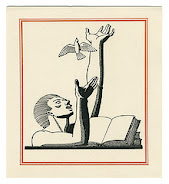As this was my first Murdoch novel, I was amused to note that odious self-absorption seemed to be a basic requirement for many of the characters (or, at the very least, first-person narrators). Martin's mistress is one of the only people who give it to him straight:
'If people interfere with you it's because you like it,' said Georgie. 'You're dying to be interfered with. You're a sort of vacuum into which interference rushes. Anyway, it wasn't anything to do with you. Why do you assume everyone is so interested in your doings?'The novel also reads as a comedy of errors--the romantic reversals are of Shakespearean proportions. Pure straight-faced silliness couched in serious narrative. But there's also quite a lot underneath:
'What anyway does a love do which has no course?'I hope to pick up more of her novels the next time I'm stateside. (I've read many a glowing word for The Sea, The Sea.)
'It is changed into something else, something heavy or sharp that you carry within and bind around with your substance until it ceases to hurt. But that is your affair.'
Meanwhile, I've spent most of the evening investigating Lemony Snicket's "Nameless Novel." Although the situation is quite serious, I am happy to report that I've discovered all the clues--up until today, that is. Tomorrow is another matter entirely.
And I must add: Any author who devises such perverse "reading group" questions is certainly deserving of your time.
2. The theme of The Reptile Room might be best stated, "Look out for Count Olaf--he will try to murder you!" Why do you think there are so few books that deal with this theme?
4. The Miserable Mill brings up many important issues of the day, including child labor in the lumber industry, hypnotism within the medical profession, gum-chewing, cigar-smoking, cross-dressing, and the futility of coupons, bankers and optimism. How does the treatment of these issues in Snicket's work differ from their treatment in the newspaper, on television and in musical theater?
5. Does anything in your life compare with the anguish the Baudelaire children encounter in The Austere Academy? If so, how terrible for you. If not, how nice. Discuss.
7. Violet, the eldest Baudelaire child, often risks her life when using one of her inventions in a desperate attempt to escape Count Olaf's treachery. Is this a proper role model for young women?
12. If Count Olaf is still at large, isn't it risky to attract his attention by purchasing and reading any of Mr. Snicket's books? Discuss.
13. Who is standing behind you right now? Discuss.


1 comment:
Give it a glance and you'll know *exactly* what I mean.
Post a Comment